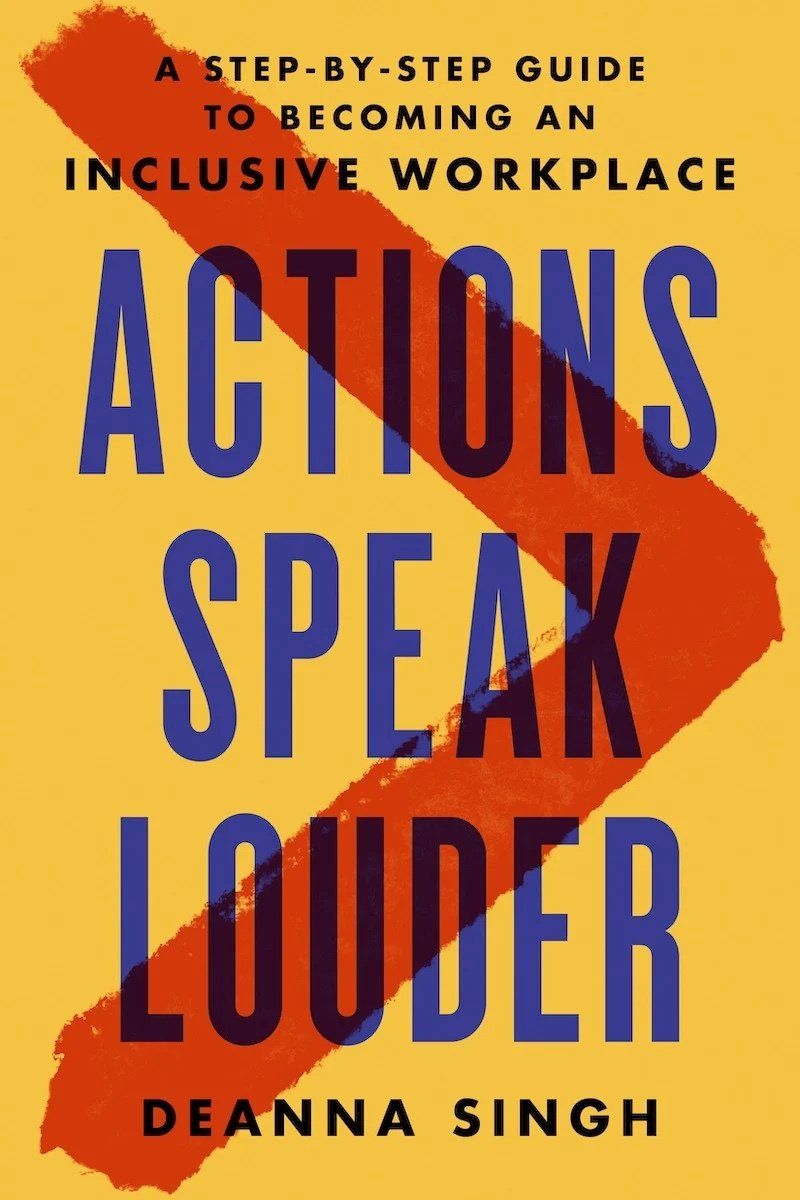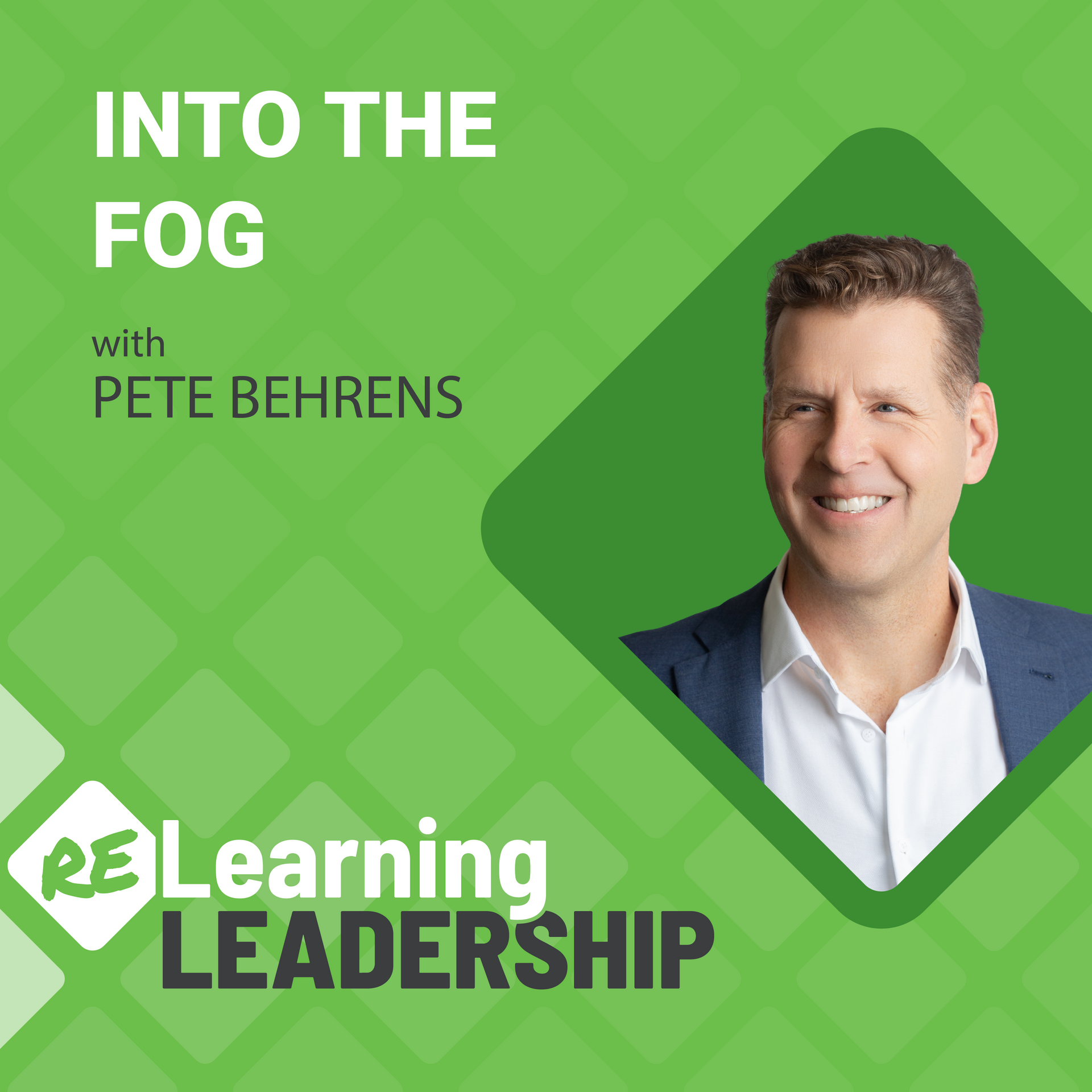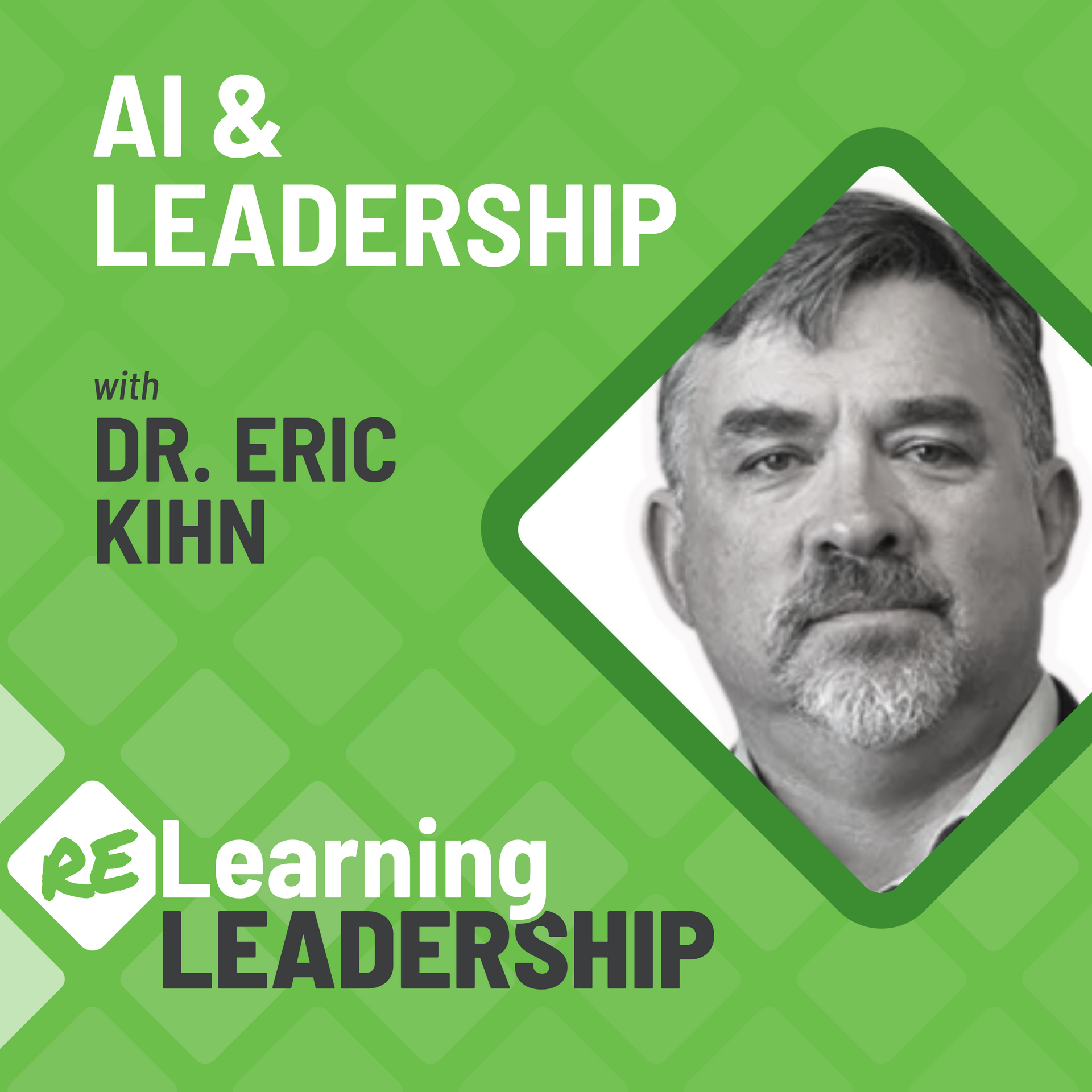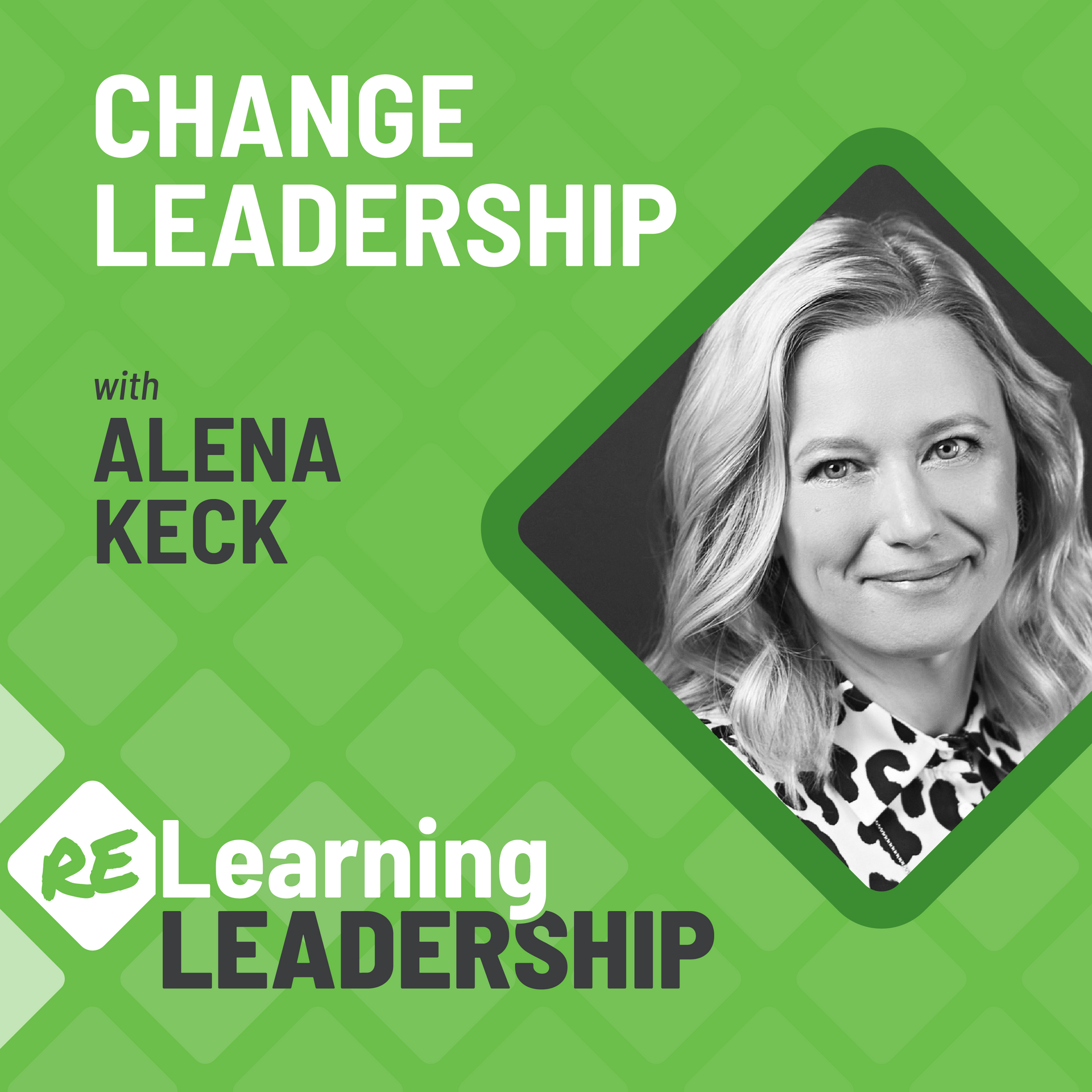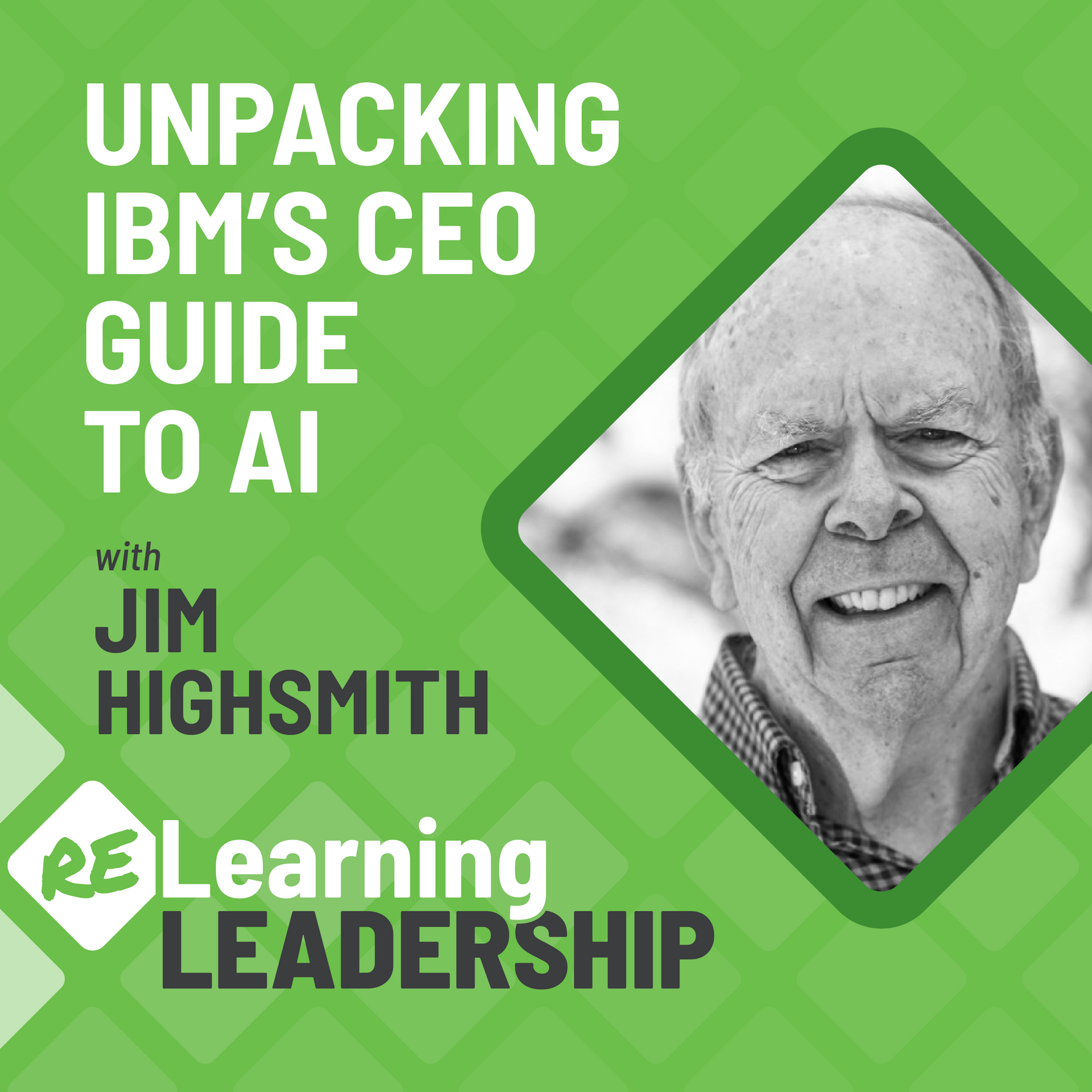27: Power Play
What is the role of a leader to shape the balance of power?
Deanna Singh, author and social entrepreneur, shares the role leaders play in shaping and sharing power along with her experience as a human, mother, coach, leader and catalyst in role modeling this behavior for others.
Pete and Deanna discuss how leaders can be more aware and actively use their power to catalyze their goals and the people engaged with them.
Deanna Singh, Founder, Chief Change Agent at Flying Elephant
Flying Elephant is an umbrella organization for four social enterprises with a mission to shift power to marginalized communities.
Deanna is an award winning author, educator, business leader, and social justice champion who speaks to over 50,000 people annually, giving audiences the tools and courage to imagine, activate, and impact the world as agents of change.
Connect with Deanna
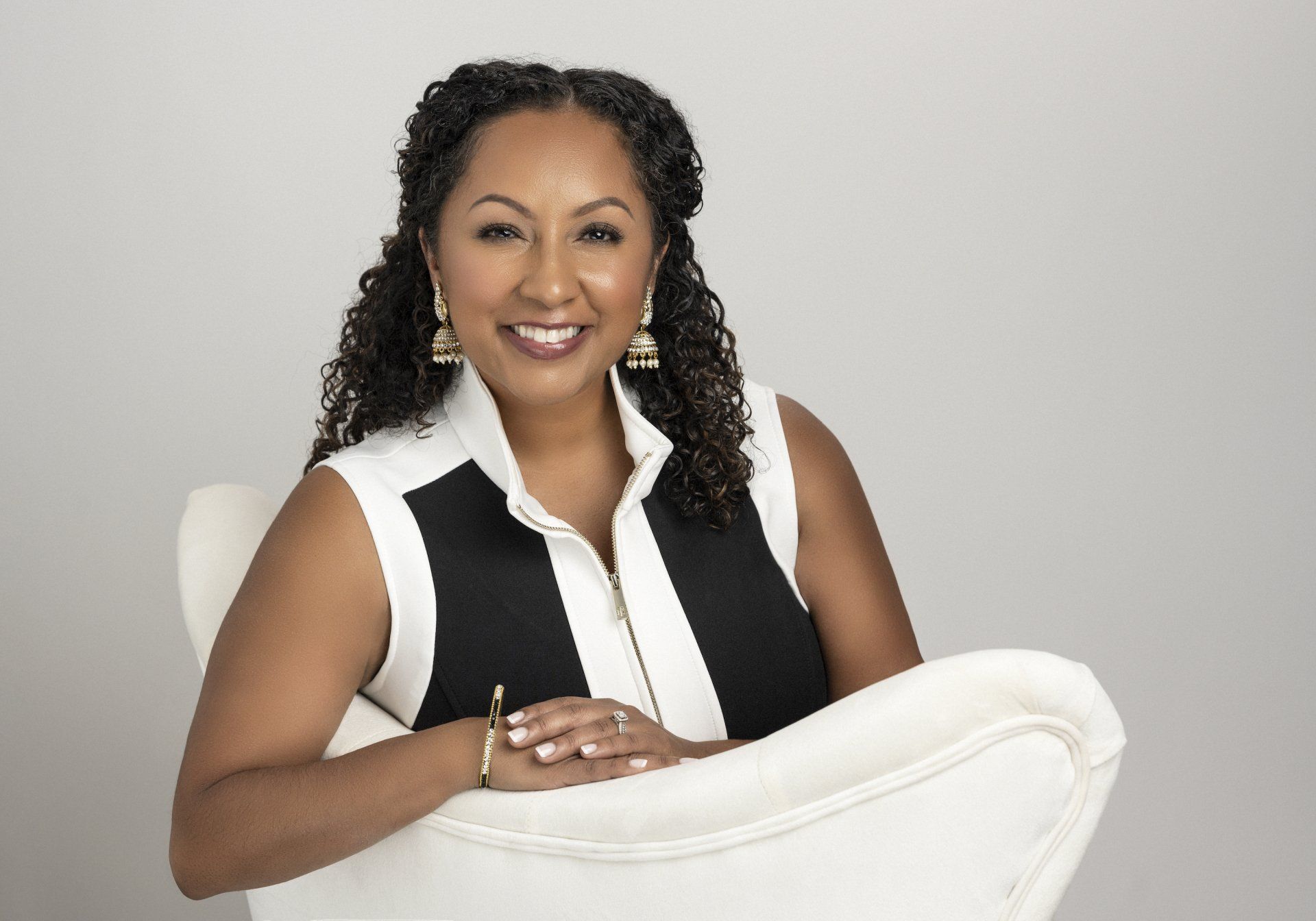
Check out Deanna's recently released book
Many companies have found themselves searching for guidance on how to create diverse, equitable, and inclusive workplaces that translate ideology into action.
Designed for teams to read together, Actions Speak Louder offers a comprehensive blueprint for those ready to look at their surroundings with new eyes, get out of their own way, and turn their energy into a concrete plan.
(Re)Learning from this episode…
As a college student, I was an intern for a power utility company in St. Louis. I was fascinated by their seasonal strategy to balance the power grid and make a profit by brokering power between the north and south. Following the weather patterns, they’d buy power where the demand was low and sell it where demand was high. I see Deanna as the ultimate power broker.
Let’s review some key points highlighted by Deanna.
- Everyone has power. Be more aware of your own power and how you are using it. Too often, leaders have the power but fail to harness it.
- Share your power. If knowing and wielding your power is job one, using your power to raise up others is a close second.
- Show courage to be wrong. There is not one “right” way to lead. However, there is a wrong way: inaction. Inaction is like turning the power off. Have the courage to try something.
We Celebrate Joy Zimmerman’s Milestone
Joy Zimmerman, the creator of the music you hear on this podcast, is celebrating an award-winning album this summer. The Canvas Before Us reached Top #8 on the International Folk Chart!
Visit Joy Zimmerman Music
For this episode, one stood out:
Courage Walks Alongside.
On the opposite side of power lies courage. The courage to stand up, to speak out, hold your truth, and to raise up others. Deanna has a jar overflowing with courage and sharing it with so many others.
Enjoy Courage Walks Alongside by Joy Zimmerman.
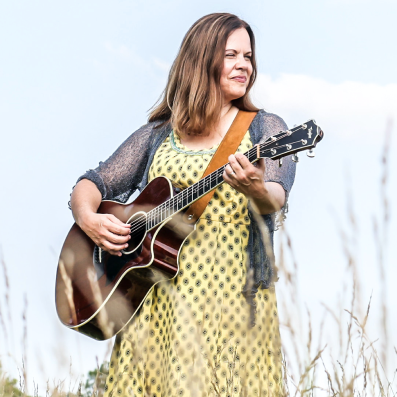
Episode Transcript
Pete Behrens:
What is the power of a leader?
Welcome to another episode of Relearning Leadership, where we explore a specific leadership challenge and break it down to help improve your leadership, your organization…and even your personal life.
My guest today, Deanna Singh, exhibits a tireless energy in raising others up through sharing her power.
Deanna Singh:
I think the first is acknowledging where you have power, how it shows up. Just recognize what is your power, and what does it look like? The second thing is really thinking about—how are you using that power?
Pete Behrens:
Deanna was just named the 2022 Woman of Influence by the
Milwaukee Business Journal. My name is Pete Behrens. Thank you for joining us today. Let’s dive in.
Welcome to the show, Deanna!
Deanna Singh:
Thank you so much! It's such an honor.
Pete Behrens:
So, I've seen you call yourself a social entrepreneur. I'm wondering if you could describe that for us.
Deanna Singh:
Absolutely. So, when we think about this idea of social enterprise, what we're really thinking about is what is an organization that is founded to try and solve for a big issue. So, in our space, our company, Flying Elephant, is actually an umbrella organization for four social enterprises, all trying to make the world a little bit better.
Pete Behrens:
So, I've seen your rap sheet. An entrepreneur, a coach, author of a children's book, and now a leadership book, podcaster, a birth coach - doula, teacher, wife, mother, lawyer, change agent, political advocate. I could go on. What weaves this together for you? What's tying it together?
Deanna Singh:
So, a few years ago, I wrote a whole book about this because, Pete, I would get this question all the time, right? People would want to know—how do I pull all these different things together? Because if I look at your LinkedIn profile or I read your bio, like, I don't get it! What are you doing here?
Pete Behrens:
“You're confusing, woman! Come on, pick a side!”
Deanna Singh:
And so I wrote a whole book about this, because—and the book is called Purposeful Hustle.
For me, everything that ties it together is really this understanding of purpose. And the way that I define my purpose is—how can I shift power to marginalized communities? So, even if you look at the four companies that we operate right—one is a children's book imprint. Why do we have that book imprint? Because we're trying to shift power to children who don't get represented in children's literature. We have a doula company. Why do we have Birth Coach Milwaukee? Well, it's because there's incredible disparities in birthing outcomes right now, and we thought that we could really make a difference in that space. Why do we do Uplifting Impact, which is our diversity, equity, and inclusion consulting group? We do that work because we know that there are so many peoples who are being left on the margins in their workplace, which is where they spend a majority of their days. So, if you go back and look at my LinkedIn profile now, or you look at the bio or anything, hopefully that makes sense, Pete, right? Every single thing that we do is about—how can we shift more power to more people?
Pete Behrens:
As a person who's probably in a power majority, what is it we can do? What is it someone who is in power in our political system or social systems can do? Or what would you like us to be more aware of to help balance some of this power?
Deanna Singh:
Well, I think it's really important to note that everybody has power. It doesn't actually matter what your social identity is or what your title is or what job you work in or where you live. Like, everybody has power. The question is—are you using it?
So, I really appreciate the question that you have, and I think that one of the number-one things to do is first to just recognize what is your power, and what does it look like? For example, some of my power—right?—I have the ability to have wonderful conversations with people like you. I have the ability to write books. I have the ability to get a microphone and stand on stages. Those are things that are within my power wheelhouse. And so, what I try to do is—I make sure that in all of those places, I really show up in a way that's going to make a difference—right?—that's going to make the world a little bit better place. I think the first is acknowledging where you have power, how it shows up. The second thing is really thinking about—how are you using that power?
Too often, where I see people making mistakes, particularly as leaders—is that they're not intentional about where they're using their power and how they're letting that power show up. And so, for me, I feel like that's the one-two, right? First: recognize that you have it. Two: be intentional about how you're using it.
Pete Behrens:
I like where you're headed with that. I think the book by the Netflix Chief People Officer talks about that same difference [Book:
Powerful by Patty McCord]. You don't give people power; you basically help them release their own power. And I think that's a big difference. It's not a gift. It's not,
“I'm giving you power.”
It's almost stepping back or getting out of the way or allowing that stage-sharing, in a sense.
Deanna Singh:
So, one of my theories—and this is one that I hold to very, very, very strongly—is that I think, actually, all the solutions for all the problems in the world exist already. Period. I think that the challenge isn't that we don't, or we couldn't, solve for cancer, we couldn't solve for covid, or we couldn't solve for some of these big pressing issues, or global warming, or whatever. I really think that we haven't been able to shift enough power to the people who have the solutions, right? So, if we were all showing up in a way where we were really thinking about this idea of shifting power, I think that we would be able to see more of those solutions uncovered in a much quicker way. So that is my—that is like a theory of change that I hold to, and it's something that I think is really motivating, right? When we think about,
“Well, why would I do that? Why would I spend the time? Why would I make the extra effort?” Well, because you might be the person that, if you are able to take that step back or pull somebody forward or give somebody the opportunity and the platform to be able to use their power, I mean, you could be—right?—the step. Or it could be in you! There's lots of people who have power and aren't intentional about it, so they're not using it. It's just being wasted.
Pete Behrens:
Well, you're somebody that sounds like I would like to work for. I don't say that often, because there's not a whole lot of leaders I probably could work for, but you do sound like somebody that I would love to work for. So, we'd like to peek behind the curtain here a little bit. How would you define your personal leadership style?
Deanna Singh:
So, this is one that I think is—it's important to me, and I hope that this is the way that people I work with get a chance to experience it. But I think one of the big things is that I really want to be a part of somebody else's story. Meaning that I want to be the kind of leader that allows for people to take risks, allows for them to thrive, allows for them to teach, allows for them to learn. And so, really, when I think about, like, what is the kind of leader that I want to be? I really want to be the person who's, like, busting open doors, right? And maybe putting some things in to prop the door open a little bit, or showing people where other doors might exist. I always tell everybody—and it's probably a weird thing to say on someone's, like, first day or first week. Like,
“Hey, I would love for you to stay with us for as long as you are going to continue to grow. But the minute you're ready to make a transition, or you're ready—like, I also want to be your greatest cheerleader. So, let's make sure that on this stop—right? If the stop lasts for the next couple months, if the stop lasts for the next couple of years or decades, let's just make sure that
on this stop, whatever I can do to support you in being your best, that we make that happen.” And I think people are like,
“Wait, is she talking about me leaving already?” And I'm like, “Yes!”
Like, I—I mean, I should be the person, right? If I'm your leader, I should be the person that you want to show up in your recommendations. I should be the one who's helping you navigate what the interviewing process looks like or navigating what the steps in your education looks like. Who else would be better suited to do that? So, let's go ahead and just get that right out there right away. I'm on your team.
Pete Behrens:
Well, they're not going to fly if they don't leave the nest, right?
Deanna Singh:
Right! And, you know, people, I think—we are all, like, here to do something that's our purpose, right? And sometimes you need to try some things out, learn some things, gain some different knowledge so that you get more clarity on what that purpose looks like. What a fool would I be if I stood in somebody's way, right? I mean, I ultimately, like—I believe that, yes, I'm living in my purpose, and I want people who are aligned with that and, like, to be on our team and to be working towards it. And if your purpose is pulling in a different direction, then I want to give you that space to do it. I want you to find that.
Pete Behrens:
I think the true definition, to me, of effective leadership is in that authentic space. And I see that in you. The passion of what you're teaching and the voice you're trying to propagate is exactly the way you're trying to lead. And it's just amazing to see that alignment in your work and in your style.
Deanna Singh:
Well, thank you very much. I, you know, I will tell you that I have tried many times to step away from my purpose and failed miserably. It was painful—right?—to not have that alignment. And so it is something that I definitely—I have some scars to show you, Pete. I could roll up my sleeve and show you some scars for what it took to get to this moment. But I would just say to you and to all your listeners, like, the peace that comes with knowing that you're living in your purpose and doing what you're intended to do, what you're uniquely positioned to do—I mean, once you have it, there's nothing like it. I don't know that I have a choice to do something else at this point.
Pete Behrens:
Hm. Well, you mentioned scars and some past. Is there a deeper drive behind some of your
why?
Deanna Singh:
Oh, yeah. Definitely.
Pete Behrens:
Yeah. Do you mind sharing some of that?
Deanna Singh:
Oh, sure. You know, I think, for me, one of the big things, like—right?—when you think about this idea of marginalized people, like, or marginalized communities, where does that come from? Where does that connection come from? My entire life, I've had the opportunity to witness what it feels like to be on the margins. And we could talk about that in so many different aspects, right? In the professional sense, until very recently, I was almost always the youngest, right? I was almost always the only woman. I was almost always the only person of color in the room. If we think about, just, even my family history, right? My father—he is a turban-wearing man. So what that means and all the social context that we show up in, right? My mom, beautiful African-American woman, grew up in the projects. My mom and dad built an incredible business together. And so, to watch them not be able to get the traditional loans. I saw what it felt like to be an immigrant from a disenfranchised community. And to see how, even despite all of that, they still found community, they still found a way to move forward. And I still found community and a way to move forward.
So, yeah, it's deep, Pete. Like, this is not a, you know, pastime for me. This is, like, a deeply rooted desire. There were so many people who poured into me, into my family, in order for me to even be in a position like this. I can't—I'm overflowing with the amount of things that have been imparted to me, and I need to keep on, right?—like, pouring into other people.
Pete Behrens:
Well, it seems like, as much as I want to believe we're moving forward, we see just as much setback. Whether it was Rodney King years ago, or whether it's, you know, the Breonna Taylors of the last year or two. I feel like one-step-forward, two-steps-back. And I'm wondering, how do you work through the pain or the frustration and the setback? How do you get past that?
Deanna Singh:
Well, I will tell you the first thing is—I actually make a lot of room for my feelings. And I think that that's just important to acknowledge, because there was a time where I thought, like,
“Nope. Just gotta keep pressing forward.”
You know, okay, whatever. We could just keep going, keep going, keep going, keep going. And I've learned that that's one, not healthy for myself or for those around me. But, two, it's not being that authentic leader—right?—that we were just talking about earlier. A lot of what happens in a lot of the work that we do hurts. I mean, it hurts really, really, really bad. I won't go into, you know, some of the more personal stories, but I've had people murdered. I mean, you know one of our dearest family friends was killed at the Sikh temple here in Wisconsin. My caretaker was shot in the head because somebody wanted to see if he bled different, if the color of his blood was different. That was the direct quote. So I have lost people who were dear to me, right? I have seen people
murdered as a result of hatred, as a result of ignorance, as a result of just not having this information. And that pain is very, very, very real. So, the first thing I would just tell you is that—and it was a lesson learned, right?—to just make the time to actually be in those feelings. Because I think it's important to acknowledge them.
But I think the second thing is to also understand what you're going to do with it. And for me, the question always becomes, “Okay, this hurts. This is painful. This is hard to watch. It's really tough to look at the news, right?” So, now what am I going to do, given what my purpose is? What am I going to do to make sure that I'm part of the solution and not just rehearsing the problems? What am I going to do? Right? Because at the end of the day, even when it's the worst, even when it's awful, even when it hurts so bad you feel like your insides are being pulled apart, we still have a choice. We still have a choice about how we're going to respond, you know?
So, I'll give you an example. After the massacre here at the Sikh temple, on the same day that I was dedicating my son, right?—I share in the story that I had a time where I was holding my two children, and I was the only person besides the priests in the temple area of the Gurdwara, which is the holy temple for Sikhs. And I was holding my children and thinking, “Well, if I—how can I hold my body so if somebody comes in here and shoots, they won't get us all?” That is a horrific thing to think about. And so, after that experience—right?—and the funeral and, just, all the things, right? There was a question of, “Well, what are you going to do?” And so, I'll tell you some of the things I did. One: a lot of the people in our community don't feel comfortable; English is not their first language. And so, what I did was—I did a lot of the behind-the-scenes. I did interviews. I helped coach them up so that they would feel comfortable doing those interviews. Another thing is, I wrote—one of the children's books I wrote was called Cloth Crown. That was me trying to deal with some of that frustration, right? So, it's a story about a little boy who's getting teased about why he's wearing his patka, which is a turban that little boys wear. And why is he wearing that, and what should he do? And he has this beautiful conversation with his father. A conversation I've heard many many times, right? And so, that was the idea there. We also put on this amazing show called Raghead, here in Milwaukee, and I was the executive producer of that show. We sold it out. And that show really, like, exemplified what it feels like to be an immigrant family in the United States and all the different characters—right?—that sometimes go into these mass shootings. These were ways to be able to take something, to really take something that was, I think, meant to destroy a part of who I am and my social identity and to turn it into an opportunity to educate. Which is my space of genius—right?—or my zone. Take it into a place where I could actually live out my purpose.
Pete Behrens:
Well, and I think what you're reminding me of is—you know, as leaders, it's easy to try to separate the human from the worker, separate social issues from business issues. But what you're indicating here is we're all human at work. And I don't believe there is an effective way to separate. But as leaders, I think it's our duty, as you're saying. You take those moments to open the discussion. You take those moments to share and reflect and give people space for that feeling.
Deanna Singh:
You have to, right? I mean, you have to be able to see who people are, because we can't actually expect people to accept our kindness or our goodness if we can't actually make the space where we accept theirs, right? And somebody gave me this example after a death in my family. Like,
“Deanna, what can I do to help you?” I'm like, “Nothing. I'm all good.” This and that. They're like,
“Wait a minute! If you don't accept what I'm trying to offer right now, then when we turn back around, and this situation becomes something—right?—where you want to give me, then I won't be able to accept it either.” You have to model that behavior. So I'm going to make a lot of mistakes, right? Daily, I'm going to make mistakes. I'm going to say the wrong thing. My intentions won't match my actions. And so, if I can't, like, give grace in those moments—right?—use those as opportunities to educate myself and others, then how can I expect that they'll do that for me when I make those mistakes? If we're all going to get better, then we all got to be in this together. We all got to be willing to kind of make those adjustments as we go.
Pete Behrens:
We get a lot of questions when we teach leadership. It's like,
“Well, how do I know if it's the right thing to do, the right decision, the right action, the right words to say?” Whatever that might be—question to ask. There is no right. And I think what you're indicating is—there's only the ability to take action that's intentful and then reflect on how effective that was and to learn from that. I think what you're getting at here is exactly that space of—be more intentional about it and give space to reflect and say,
“Oh, okay. That wasn't ideal, or that could have been done differently.”
Deanna Singh:
Absolutely. We're all in draft format. And so, why wouldn't we take these as opportunities? We have this thing in our house. Like, when we fail, my kids, you know, they’re like,
“Oh, man, that didn't work out! I didn't do this.”
And we will be like,
“Oh, are you kidding me? That's amazing! Congratulations! You failed. That's so awesome!”
And the reason why they do that—right?—is because that is something that, as a family, we decided. We were going to celebrate those opportunities. Like, wow, that just means, like, I mean, you won't do that one again, right? You found a new way to fail, congratulations! Now you might be a little bit closer to getting to whatever the success might be. And that mentality—right? Like, that shift of thinking, I think, is the kind of thinking that we have to apply in all of these different spaces. And it's the kind of thinking that we try to apply, even in the diversity, equity, and inclusion space. People are so afraid, like you said, of saying the wrong thing, doing the wrong thing, that they do nothing. And I cannot tell you—doing nothing is worse than trying something, saying, like,
“Look, I'm not really exactly sure how to—I feel very awkward in this moment. But here's my intention. You know, this is what I think might work. What do you all think?” If you can't model that, then, I don't know—then it's really hard to—you'll just get stuck. You'll just constantly stay stuck. And I think what ends up happening is that people then think that you don't care, right? That's what it gets interpreted as: you don't care. Which—no leader wants that on their docket. Or you don't see the people who are around you. Also, no leader wants that—right?—for their people to feel like they're invisible. And so, when you think about doing nothing, I always say it's worse than you saying,
“Look, I'm not exactly sure how to go about this. Let's learn this together, right? What do you think should be the next step? Here's what I think. Is that right? Is that wrong? Here's what my intentions are. Here's what I'm trying to get to. Can you help me get there?”
Right? That's an invitation for growth.
Pete Behrens:
I remember a coach I was coaching. And he would often go to a team meeting and then leave. And the team was wondering,
“Is that good? Is that bad?” Like, he didn't say anything. And so it was one of those moments to talk about.
“Hey, if they're doing great, just say, ‘Hey, you guys are doing great. I'm going to head out. Keep going!’”
You know? But they need something, as you said. They need something. This inaction can be the most damaging. So, besides inactivity, or maybe the fear to take some action, what mistakes do you see leaders making in this space when we're dealing with cultural differences, we're dealing with mindset perspective differences? You could even get into political or vaccine differences or, you know, whatever that might be. What are the mistakes leaders are making that cause confusion to disengagement.
Deanna Singh:
Yeah. So, one of the ones that I see, particularly from leaders, is—they're trying to think about how to build inclusionary practices in an exclusionary way. So, this is what I mean, right? They will, with the best intentions:
“You know, I really want to make sure that my team feels like they can participate in the conversation, and so, what I'm going to do is—I'm going to make a mandatory meeting for everybody at seven o'clock in the morning, Monday through Friday in my office on the top floor.” Whatever! Add in all kinds of, whatever, things, right? But You can hear in the things that I'm saying. There's a whole lot of people who, if they come to that meeting, are going to be probably pretty intimidated to conversate. A better way to go about that would say,
“Hey, my intention is that I really want to give us more opportunities to have voice, right? And for people to participate in the conversation. I'd really love to get some suggestions from the team about what that looks like. Oh, it looks like we have a water cooler channel on Slack. Oh, so everybody can kind of, like, put in their own thoughts. And isn't that awesome!
These are simple adjustments. They don't require you changing your schedule for everybody—right? Bringing in a whole additional cost. But those are the kinds of things that end up getting left on the table. Because we think that we have to come up with all the answers and all the decisions ourselves. And so, we use exclusionary practices in our efforts to create inclusion. And it ends up, you know, being a problem.
Pete Behrens:
I love the Hippocratic nature of that statement. What you're indicating here is—it's often a lack of awareness, or a lack of even understanding that the action they're taking is working against them, to some degree. So it's not bad leadership. It's more an ignorance, or just an unawareness, it sounds like. They feel like they're being helpful, when in fact they're taking on too much responsibility.
Deanna Singh:
Yeah. There's this part of us, as leaders—we show up in leadership spaces because we like to serve, right? So if I'm throwing a party, I'm putting a meeting together, one of my first thoughts is,
“Let me do everything!”
And then you just show up, and that'll be so great. You could just show up. You don't have to worry about all the headaches and this and that. But what ends up happening? If I do that, then I'm taking away your power to actually contribute meaningfully to whatever it is that I'm trying to put together.
Pete Behrens:
Let me take the other side of this—and not really
devil's advocate,
but let's take it to its extreme about—give everybody a voice, and all of the sudden, no decisions get made. So, how does a leader not get too much into that consensus mode, where we go back to inaction because there's too many options on the table, too many variables to deal with? And so, it's just easier not to do anything.
Deanna Singh:
So, I always try to make this distinction. It is really important that you help people understand what the process is and where they can participate in the process. And the process can be and should be—I will say this a million times over, as somebody who's a leader, because you can be a very challenging leader if you can't make any decisions. So the process should be,
“This is how we gather information. I am sharing with you how we gather information. This is the way and the things I'm going to use my decisions, like, base my decisions on. And then I'm going to make a decision.”
Pete Behrens:
So it's distinguishing the decision process and the decision authority. So, not every decision has to be a group decision. Not every decision necessarily has to be a dictatorial decision. But helping people recognize,
“Okay, this is something we probably want to talk more about. And then let's do a majority. This might be something where I'm just gathering info.” Like, you say,
“Hey, this is going to be a consultative, but I'll make the decision.”
So, it sounds like being explicit about that can be very helpful.
Deanna Singh:
Incredibly helpful, right? We're so fast. We're moving so quickly. We have so many things. And so, I'll hear from somebody, and they'll give me something, or they'll share something, and then I'll make a decision. But I never really gave them the process or told them. And so, they might think,
“Oh, Deanna didn't take my thought into consideration at all!” Or they might think the opposite:
“Oh, it's because I said this thing that Deanna—”
Right? So, you want to make sure that you're making it clear. Like,
“Hey, I'm coming to you. This is what I'm trying to do. This is how I made my decision.”
I also think that we have to be able to say, “Hey, this is where I was at. This is what I was struggling with. I made this decision. Here's what I'm still worried about. Here's the risk that I'm taking. Here's why I'm taking that risk, and here's how you were helpful in helping me come to this decision.” I'm showing my work. And I learned this because I did a lot of work in education. If I just tell you the end result, you're going to keep coming back to me, right? You're going to slow our process down. I'm going to slow our process down by not having brought you into it every time I can.
Pete Behrens:
Well, and a key component, I think, in any healthy system is people feeling comfortable to say they were hurt, they weren't listened to. That—you know, and that is the feedback loop. And without that, you're going to be blind for a long time.
Deanna Singh:
Yep. You're not going to know what people are thinking, how they're feeling, who's got that big solution but won't give it to you because they don't trust that you're going to actually utilize the information that they're sharing with you, right? That's that shifting power. If I just show up, and I give the decision, that's it. Or if I make it completely consensus—right?—and I'm not holding my power of being able to be a decision-maker, in both instances I'm doing the wrong thing with my power.
Pete Behrens:
Well, you've got a book coming out this month. Congratulations!
Deanna Singh:
Thank you!
Pete Behrens:
Give us the elevator pitch on this. Why should one of my listeners—or why should I—read this book?
Deanna Singh:
So, here's the thing. I think that all of us have a desire to make sure that our workplaces are the kinds of places that people want to show up to. We want it to be a place where people are excited. Like, we want them to have that sense of purpose and that sense of joy in the work that they're doing. I believe that. Where I find the biggest problem is—is that they don't know how, right? They don't know what it actually looks like in their day-to-day practices. Or they're on their own, trying to kind of piece things together. And so that was really the impetus for writing the book. It's a guidebook. You could try things out. You can read it with your team in whatever spaces you're occupying.
“I want them to be inclusive, and I want to be part of that solution. How do I do that? What does that look like? What are some of the questions I should be asking?” Then this is the right book for you.
Pete Behrens:
As you were describing this, the thought that came into my head—and it's kind of a snarky one—was thinking of
The Office and them doing a book club on this
Actions Speak Louder book.
Deanna Singh:
It's so funny that you bring up
The Office. We are definitely fans of it. And the reason why we're superfans of it is because we pause it, right? We use it as an opportunity to say these are the things you shouldn't be doing!
Pete Behrens:
We're going to see Deanna as a consultant going into
The Office to help workplace culture. [Laughs]
Deanna Singh:
That'd be great!
Pete Behrens:
I love it. Well, Deanna, I just want to say thank you for sharing with us today. Thank you for your voice and creating a platform for other voices to shine.
Deanna Singh:
Well, thank you so much. I appreciate you doing the same. This was really a lot of fun.
Pete Behrens:
What an incredible package of passion and energy! I love Deanna Singh!
As a college student, I was an intern for a power utility company in St. Louis. I was fascinated by their seasonal strategy to balance the power grid and make a profit by brokering power between the north and south. Following the weather patterns, they’d buy power where the demand was low and sell it where demand was high. I see Deanna as the ultimate power broker.
Let’s review some key points highlighted by Deanna.
- Everyone has power. Be more aware of your own power and how you are using it. Too often, leaders have the power but fail to harness it.
- Share your power. If knowing and wielding your power is job one, using your power to raise up others is a close second.
- Show courage to be wrong. There is not one “right” way to lead. However, there is a wrong way: inaction. Inaction is like turning the power off. Have the courage to try something.
Thank you for joining us today. And stay past the credits for another gift from Joy Zimmerman.
Relearning Leadership is the official podcast of the Agile Leadership Journey. It’s hosted by me, Pete Behrens, with analysis from our global Guide community. It’s produced by Ryan Dugan. With music by Joy Zimmerman. If you loved listening to this podcast, please leave us a review. And visit our website, relearningleadership.show, for guest profiles, episode references, transcript, comments, and more. And to (re)learn more about your own leadership, visit us at agileleadershipjourney.com.
This season, we are celebrating Joy Zimmerman’s award-winning album,
The Canvas Before Us. For this episode, one stood out:
Courage Walks Alongside. On the opposite side of power lies courage. The courage to stand up, to speak out, hold your truth, and to raise up others. Deanna has a jar overflowing with courage and sharing it with so many others. Enjoy
Courage Walks Alongside
by Joy Zimmerman.
Explore:
Recent Episodes

